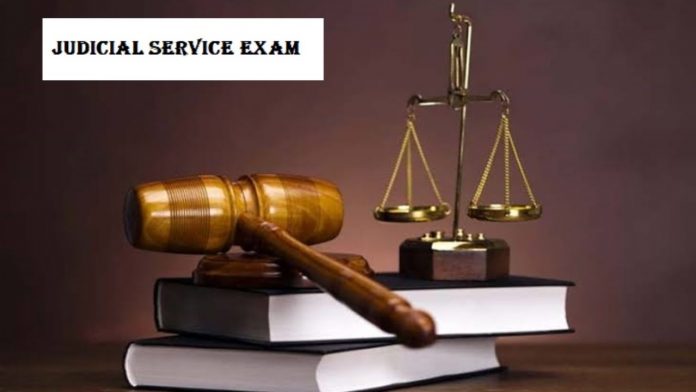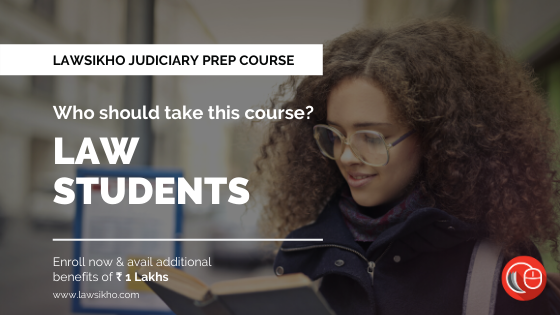This article has been written by Oishika Banerji, an undergraduate student at Amity Law School, Amity University Kolkata. This article deals with the strategies and insights required for cracking West Bengal Judicial Services.
Table of Contents
Introduction
Law is a very dynamic field, and therefore the professional scope of any law graduate is divergent in nature. Judicial service is one such scope that many law graduates desire to pursue in order to work with diligence for the Indian judiciary. For doing so, one needs to appear for the Judicial Service Examinations that take place every year in different states across the nation. This examination is the entrance for any law graduate to serve as a Judge in the lower judiciary of our nation. One of the most difficult jobs is that of a judge for he or she becomes the person to decide what is correct and what is not following the legal statutes and procedure without being biased. A demanding professional field, judicial services see a huge number of candidates appearing for the same in order to pursue a secured professional tenure. To be a part of this competition and succeed in the same requires planning, intention, and strategies which one can have either through self-studying or by the help of any coaching institute. Knowledge from all angles of law is required to be successful in this examination. The exam is divided into three stages through which a candidate is supposed to go through before taking up the responsibility as a judge that are discussed in the latter part of the article. The stages are:
1) Preliminary Examination
2) Main Examination
3) Personalised Interview
West Bengal Judicial Service Examination
The state of West Bengal conducts the Judicial Service Examination on a yearly basis held by the Public Service Commission. The examination takes place for recruitment for the post of Civil judge.
Structure
Without knowing the framework of the examination, strategies cannot be laid out as to how to crack the same. Therefore, as the strategies and insights of an examination is necessary to be known, the structure of the exam specific to the state of West Bengal must be also known. The West Bengal Judicial Service Examination takes place in three stages, like all other states conducting judicial services examination. The three stages are:
Preliminary Examination
This is the first stage of the examination which is inclusive of one exam of objective type consisting of 200 questions of multiple choice. The preparation for this paper will include a general knowledge of all aspects as expected by a freshly graduate of law. The 200 marks paper will consist of the basic statutes taught in a recognised law school which includes the Constitution of India, Law of Contracts, Law of Torts, Evidence Act, Civil Procedure Code, Criminal Procedure Code, Indian Penal Code, Personal law, Law of Limitation. Along with this general knowledge on varieties of other subjects and comprehensive skills are also acknowledged. Therefore a minimal level of preparation with a fine idea about legal subjects is essential for qualifying this examination.
Final Examination
While the preliminary examination is required for testing the basic aptitude skills, the final examination looks after the subjectivity of knowledge in an aspiring candidate. The exam comprises optional and compulsory papers to attend each of 100 marks. While the compulsory papers consist of English and a regional language along with general knowledge, Civil Procedure Code, Criminal Procedure Code, Indian Penal Code, Indian Evidence Act, Transfer of Property Act and Law of Contracts and Torts, the optional papers have a wide variety of law ranging from Hindu Law, Companies and Insurance law to that of Jurisprudence and Indian Constitution. What can be inferred is that the West Bengal Judicial Service aims to cover every aspect of law and instead offers the choice to the candidates willing to appear in the exam. Viewing the pattern, it can be said that a lot of subjects are common between the two exam levels. This makes the candidates easier to find a strategy to work out both successfully.
Personality Test
The third part of this exam is the personality test that takes place. After a subjective and written mode of examination, the communication skills are at a test in this stage of the examination. Therefore what is required for this stage is to develop good communication skills and confidence to answer questions as asked. The marks of the preliminary exam are required for the selection of the candidates in the final examination. Therefore a relevant amount of marks that are required to qualify in the finals is enough to secure in the prelims. This is one of several strategies that a candidate can utilise. The marks obtained in the finals and that of the personality test will be compiled to prepare the final merit list of the candidate. Therefore the consistency required in both these levels is necessary to be present in an individual.
While preparing a strategy, the candidate must have an insight as to how to proceed with the subjective and verbal rounds of the examination. As there exists no textbook bound syllabus for this round, it is very well necessary to have an idea about any relevant topic in order to grasp the question being asked and answer the same with diligence. The originality of the work delivered by a candidate is given importance in this examination. Therefore being honest and representing self will be the basis of all strategies associated with the examination.
Eligibility
To be eligible for the examination, the following grounds need to be abided by,
1) An Indian citizen or any other nationality if declared to be eligible by the Indian Government.
2) Must be a graduate in law from any recognised university.
3) Is enrolled as an advocate with the Bar Council of any state or Union Territory in India on the very date of commencement of the examination.
4) Has the ability to read and communicate in Bengali. This ground is not applicable to those candidates who have a Nepali mother tongue.
Another aspect of eligibility is that of the age criteria. West Bengal Judicial Service examination requires candidates of the lower limit of 23 years and an upper limit of 35 years as on the day of commencement of the exam.
Strategies to crack West Bengal Judicial Services
Although different levels of the examination require a different kind of strategy as have been mentioned previously, the entire examination requires a lot of dedication and effort. In order to put them in a track of reaching the destination, every individual has to have a strategy otherwise the efforts dedicated go in vain. Every candidate has their individual way of dealing with the exam but some of the strategies that are basic and common to all candidates appearing for the examination are provided below:
Developing an aim
The Judicial Services is a dedicated and responsible set of services that need to be secured by qualifying in the examination held by several states across the nation. Before even knowing how to proceed and planning out the same, the requirement of the will to attend the exam and deliver a 100% accuracy, thereby securing a respectable chair in the Indian Judiciary is essential. Therefore the first step of building strategy is to develop an aim for successfully cracking the examinations swiftly.
Dominance over the subject
Law is a vast subject, and one cannot deny the same. The judicial service examination especially that which West Bengal holds is an amalgamation of different law aspects that are basic statutes used to regulate other legislations. An extensive hold on all the bare acts that are included in the syllabus and those beyond it is always acknowledged. This also counts as important for all the levels of the examination starting from the prelims to that of the interview round. Subjects like the Indian Penal Code, Code of Civil Procedure, Evidence Act are taught in law schools in the very beginning. This shows how important they are in order to get to know other statutes. The prelims of this examination checks in objective knowledge on these subjects whereas the finals test how much depth the candidate has gone through while studying for the examination. The final round that is the personality test is a screening by the interviewer to infer how aware the individual is when it comes to the application of the subjects.
Practice and Profess
For any competitive examination, the individual must be aware of the pattern in which the examination is conducted in the state. The same has been also mentioned before in the article. Practising previous years’ papers is useful to learn about the standard of the paper along with self-assessing oneself. The shortcomings can be identified by clearing out these papers. The mistakes committed in these papers act as a precedent to avoid such mistakes in further papers and also in the final paper of the examination. The strategy of practising is the best strategy one can adopt to clear any kind of examination.
Topic-wise preparation
As the structure and the syllabus of the examination are concerned, there are several topics that are inclusive in the examination. Preparation should take place individually, topic-wise, to be firm in all topics covered by the exam. Preparation should take place according to the distribution of marks as well. It is wholly upon the candidate to decide on what topics he or she is good in. Although a candidate should be equally good in all the concerned topics but being good in some topics help in securing marks in certain levels of the examination. As English and other regional languages are included in the exam, preparation of the same can be done by reading newspapers on a daily basis to learn new words and rectify grammatical errors. Newspapers also help in broadening the general knowledge level in an individual. Judicial service is one such examination that requires skills in general knowledge for the profession calls for the same. Hence an awareness about general knowledge is always helpful and advantageous.
Guidance
Along with preparation, there is also a need for motivation and seeking guidance as to whether the preparation that is being carried out is on the correct track or not. Therefore guidance from a judicial officer or a successful candidate who has appeared for the exam can be helpful. Their strategies may not be adopted by the others but their strategies can act as a precedent for framing and modifying new strategies.
These are some of the strategies that can be adopted by any candidate appearing for West Bengal Judicial services. These strategies can create a path to crack the examination and hold an honourable post in the Indian Judiciary.
Conclusion
Indian Judiciary is said to be vacant in search of appropriate judges. Law graduates nowadays are mostly inclined to corporate jobs to have a secured professional and financial life in the future. Not many take the courage to join the Indian Judiciary which is desperately in requirement of responsible and diligent judges. Judicial service examination is one such mode of screening individuals before they hold the responsibility as a judge. The West Bengal Judicial Service examination like all other states has been holding the examination to appoint eligible individuals in the lower judiciary.
The examination as a whole requires efforts that should be fruitful by nature. The structure of the exam is such that it judges an individual from various angels. Therefore the preparation that should be taken prior to the examination should be strategically driven. Candidates must have the insight of cracking the exam for the will to join the judiciary. Serving the nation by being a part of one of the organs of the government which is essential for any nation is an honourable position to acquire along with successfully conducting oneself throughout the profession. Therefore, to hold such a position, there comes the responsibility of cracking the exam with practice, perfection, and confidence. That is what will represent one’s identity to be eligible to contribute to the Indian judiciary.
References
LawSikho has created a telegram group for exchanging legal knowledge, referrals and various opportunities. You can click on this link and join:
 Serato DJ Crack 2025Serato DJ PRO Crack
Serato DJ Crack 2025Serato DJ PRO Crack











 Allow notifications
Allow notifications


